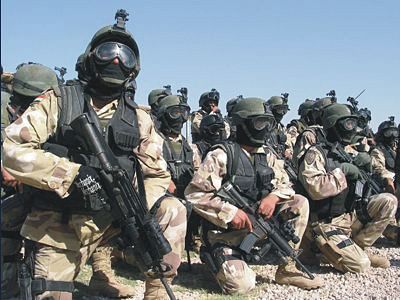Challenge of counter-terrorism strategy

Counter terrorism force personnel in Iraq.
Concerned individuals and organisations have been thinking and deliberating for quite some time upon the urgency of adopting a counter-terrorism strategy for Bangladesh that continues to remain affected by the scourge of terrorist violence. Political leaders and regulatory bodies have sought effective administrative tools and enhanced legal cover in the campaign against terrorism.
Cynics say that the establishment has been humming and hawing on the subject without actually taking a deep hard look into the complex subject and, as such, we do not have an effective strategy in place.
Adopting a counter-terrorism strategy, and that too in a sharply polarised polity like ours, is no easy task. One has to remember that, as a legal concept, terrorism lends itself far too generously to interpretation. In fact, we have amongst ourselves those wooly haired liberals who confound incidents of straightforward violence with a prolonged enquiry into the backdrop. There are quarters that seek a political statement in acts of plain terror.
On another end there is a quarter that is quite unabashed about fighting terror with terror. Such quarter would like to use every available resource, and does not mind suppressing liberty if that is required to fight terrorism.
An issue that engages many right-thinking people is whether we have an unusual situation that warrants taking draconian measures as part of a strategy. Incidentally, in a country almost fanatic about privacy and related issues such as constitutional safeguards for individual liberties, the passage of the United States Anti-Terrorism Act of 2001 would under normal circumstances have been unthinkable.
Coming to specifics, the above-mentioned American law legitimises the use of technology as a "neutral standard in intelligence gathering," giving the government absolute powers to monitor private communications and access personal information.
However, a strategy that is likely to affect every citizen and may provide the executive an alternative to the existing penal and Criminal Procedure Code and might infringe on the right to information must be accompanied by a wider public debate.
While adopting a counter-terrorism strategy, we should take note of the fact that terrorist groups are now using a careful mix of ideology and violence to achieve their ends. Similarly, the question of divorcing acts of terror from the context may have to engage the minds of people tasked to prepare a strategy paper.
In our situation we have to admit that terrorism had increased in its very nature and, therefore, changes in strategies to counter it are logical and natural. Our strategy adoption process has to examine, amongst others, links between terrorist groups, the conditions in which they had spawned and the politician-militant nexus and other forms of patronage these groups receive.
The factors contributing to the quality and extent of terrorist threats have to be taken note of. In preparing a strategy, we need to think whether the executive, in tracking down terrorists, should be subject to the same bottom line of judicial review or be given special status. Some would say that the courts should not be oblivious of the practical needs of the government.
The issue of terrorism and human rights, one need to know, has befuddled even the United Nation organisations. Therefore, can there be an across the board guarantee of human rights to all, irrespective of the means the terrorists use to achieve their ends, or whether such terrorists respect the human rights of the community they allegedly like to serve.
While preparing a strategy, we should bear in mind that a scenario cannot be countenanced where all the human rights are reserved for the terrorists while authorities dealing with the menace are arraigned regularly on grounds of violation of human rights. We have to delineate the parameters that harmonise the defence of a pluralist polity with respect for human rights.
As a matter of caution, the legal interpretation of terrorism laws must not be the personal turf of the government of the day and must not be subject to personal prejudices or opinion. The law must not foster fear among sections of the population.
In countering terrorism and the accompanying mindless violence, legal and operational arrangements would necessitate some loss of liberty and human freedom. However, the objective should be to depart as little as possible from internationally agreed principles and from the traditions of natural justice.
The aim should be to ensure that the security forces have the required assistance in their task of bringing terrorists before the courts, and that the integrity of the legal system is maintained.
The strategy has to ensure that executive power is utilised to sap a terrorist organisation of its material base, stopping routes of material replenishment and seizing its existing assets.
Our strategy may consider focusing in greater detail on expanding the category of proscribed organisations and on lawful use of interception as an investigative tool. It needs to concentrate on skimming powers of arrest and shortening the period of detention without trial and allowing robust judicial scrutiny. It would be up to the ingenuity of the government to turn proposals into real enforceable acts.

 For all latest news, follow The Daily Star's Google News channel.
For all latest news, follow The Daily Star's Google News channel. 



Comments